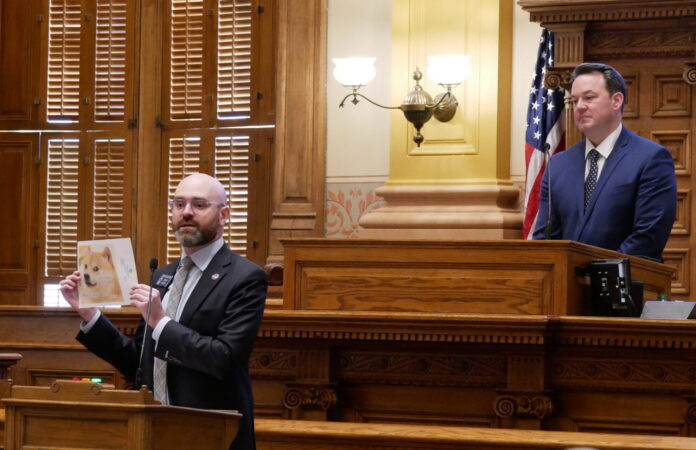
(Georgia Recorder) — A GOP proposal designed to ease regulatory burdens on small business is being billed as Georgia’s DOGE, a reference to the Elon Musk-led Department of Government Efficiency.
“The Senate is leading the way to combat burdensome and costly regulations on behalf of business owners and employees across the state,” Lt. Governor Burt Jones said in a statement Monday that was sent out with the subject line “Georgia does DOGE.”
The bill, officially called the “Red Tape Rollback Act,” is one of Jones’ priorities this session. Jones, who is seen as a likely candidate for governor in 2026, said the bill is “mirroring the great work President Trump is doing in Washington to create efficiency, reduce unnecessary spending and eliminate bureaucratic red tape across state agencies.”
The measure, which is a holdover from last year, cleared the Senate with a 33-21 vote that fell along party lines. The bill now moves to the House.
Proponents of the measure say it would hold government accountable and help the state be more responsive to Georgians. Critics say the bill creeps into the executive branch’s turf and imports the destructive spirit of DOGE – a point Sen. Josh McLaurin, a Sandy Springs Democrat, made by holding up a prop featuring the 2013-era Doge meme.
“It reflects the philosophy that government is a joke. That is what Elon Musk thinks,” McLaurin said. “He thinks his money and his wealth entitle him to run the world, and that the government that’s in place, the millions of federal workers, the laws that govern their service and put them in a position to succeed, that those laws are a joke as well.”
The bill is advancing as Georgia is beginning to feel the effects of the Trump administration’s fast-moving attempts to shrink the size of the federal government, with 1,300 employees at the Centers for Disease Control and Prevention expected to lose their jobs.
McLaurin acknowledged the proposed Georgia-style DOGE uses a different strategy than the sweeping changes being undertaken by the Trump administration, like the mass firings. But he argued that both are imbued with the same distrust of government and both take “an ax to government” instead of trying to make targeted improvements.
“One person’s red tape is another person’s due process,” he said.

The Jones-backed proposal calls for agencies to size up the economic impact of their administrative rules and requires them to review their rules every four years – something the bill’s sponsor, Cumming Republican Sen. Greg Dolezal, likened to a “four-year spring cleaning.”
And it would give state lawmakers a chance to object to the rules created by state agencies. Any rule that has an estimated $1 million economic impact would have to be ratified by the General Assembly.
Some agencies, such as the Georgia Department of Corrections, are currently not covered by the proposal, but the bill could be broadened to include more state agencies, which are generally considered the purview of the executive branch.
“It certainly does, I would say, enhance what we do here as legislators,” Dolezal said to reporters after the vote. “I think over the years, the General Assembly has largely devolved in terms of influence down to just a bill-passing authority.
“I think our constituents expect us to do a lot more than just come down here and pass a bunch of new laws,” he added.
But other state lawmakers argue that isn’t a good thing.
“I’m not sure about y’all but I didn’t come here to micromanage agencies. I didn’t come here to debate rules. I came here to pass laws,” said Sen. Jason Esteves, an Atlanta Democrat who argued that lawmakers should leave the rule-making to state agencies.
The governor’s spokesperson said Republican Gov. Brian Kemp, who sits atop of the executive branch, remains generally supportive of efforts to streamline the government but said the office does not comment on pending or proposed legislation.
Sen. Kim Jackson, a Stone Mountain Democrat, said she isn’t hearing complaints from constituents about overly cumbersome rules.
“Instead, they talk about phones that go unanswered, emails that are not responded, agencies not being able to provide the very things that they are called to because they are underfunded and understaffed,” Jackson said.
“Our agencies are not crippled by rules. They are crippled by our lack of funding. They are crippled by our lack of staffing,” she said.
The governor sets the spending level for each year’s budget, and state lawmakers move money around in the budget to fund their priorities. State agency heads have been making their annual pilgrimage to committee meeting rooms to discuss their budget needs.






